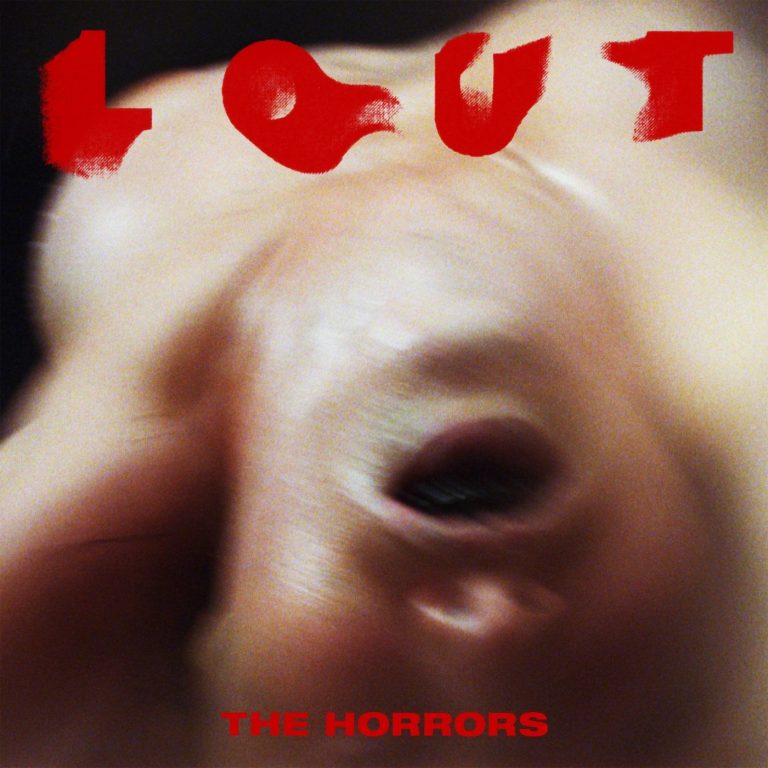Having produced five distinctly alluring albums over a ten-year period, The Horrors now return after a three-year absence to release the brief but sonically pivotal EP, Lout, a committedly experimental and Brutalist departure from previous stylistics. Strange House’s infectious post-punk swagger, Primary Colours’ new wave-infused bluster, the Skying‘s lush pop and shoegaze sensibilities, Luminous‘ synth-y psychedelia, and V’s attunement to wistful melodies and mercurial textures are all but scraped from the musical palette on this outing. Instead, The Horrors’ latest offers a loud and undiluted shade of aural nihilism.
“Lout” opens with Joshua Hayward’s distorted-guitar tsunami, Faris Badwan’s vocals stirred into the static, a hypnotic intro that brings to mind the bad-trip noisescapes of Dreamcrusher’s Panopticon!. When Badwan sings, “I got some suffering pent up inside,” he’s not reacting purely to the Western world’s voyeuristic philia for and puritanical phobia against violence and sex, he’s also channeling a transpersonal and intergenerational ambivalence; what the Greeks referred to as the eternal tension between Eros and Thanatos (the life force and the death wish, repackaged as the “death drive” by Freud).
The song’s bridge features a relatively spacey limbo replete with a chorus of monkish voices – a salute to any number of death-metal albums – the brief segment truncated by Hayward’s Tom Morello-indebted riff. “I got a devil that won’t be denied,” Badwan sings. “Truth is a stranger who turns off the lights,” he adds toward the closing. As aggressive-sounding as the piece may be, one has the sense that it’s prompted more by anxiety than rage, is more energetically centripetal than centrifugal; that is, this “devil” is more likely to trigger an implosion than an explosion; to manifest suicidally than homicidally. The one-minute video made by Jordan Hemingway and starring Isamaya Ffrench features a woman with alien eyes undergoing what appears to be a psychotic breakdown or carnal metamorphosis.
Following track “Org” opens with a welter of distorted accents, before a fusillade of electro-percussion ensues, followed by a loosely sketched and serrated melodic line. The piece shifts briefly into a synth-y and more celestial sound around the two-minute mark before re-plunging into a vortex of beats, distorted textures, and grating flourishes a la early Nine Inch Nails or Filter circa Short Bus. Interred beneath the roiling noisescape, Badwan’s voice conjures associations with toxic repression. The track is notably chaotic, a collage of musical tangents, and spotlights The Horrors’ radical leap into a fresh aesthetic, a multiform approach that at times aspires to the more fully realized and crystalline eclecticism of Liturgy’s Origin of the Alimonies.
Like “Lout” before it, “Org” gives voice to a universal tension, an archetypal dissonance reinforced by myriad minor and major traumas and the ongoing nature of familial, societal, and institutional conditioning. The track brings to mind, again, the Hellenic notion (contemporized by modern psychology) that each person is endowed with an instinctive (and egoic) urge to live (forever!), as well as the more complex wish to terminate (immediately!), exemplified by the internal dictum: I didn’t choose to be born. Life is a priceless gift and the quintessential imposition.
On the concluding “Whiplash”, staccato blasts of distorted instrumentation and electro-driven beats build something cumulatively unsettling, conjuring a troupe of vampires lamenting their inescapable anhedonia: Godflesh meets Joy Division, Death Grips meets Pertubator, Ho99o9 meets Preoccupations. If “Lout” and “Org” occur as propelled mostly by hyper-anxiety directed internally rather than externally, “Whiplash” translates as more expulsive, an overdriven tirade addressed to a fallen world and godless universe. “Another little broken boy / drag me down into dust,” Badwan sings, reiterating a self-deprecative, misanthropic, and agnostic/atheistic manifesto. Hayward’s guitar work has never been as mesmerizingly fierce or relentlessly punitive, the band seamlessly embracing noise and industrial approaches as if they’ve been exploring these templates for the entirety of their oeuvre.
While Lout offers only a sampling of The Horrors’ latest direction, it’s one that will hopefully be further developed on a full-length release. Even though there are only three tracks here, and a total of approximately 12 minutes of music, Lout represents some of The Horrors’ most expressive, uninhibited, and memorable work – a potential indicator of what might be an entirely new trajectory for this band, including, perhaps, their best creations yet.

